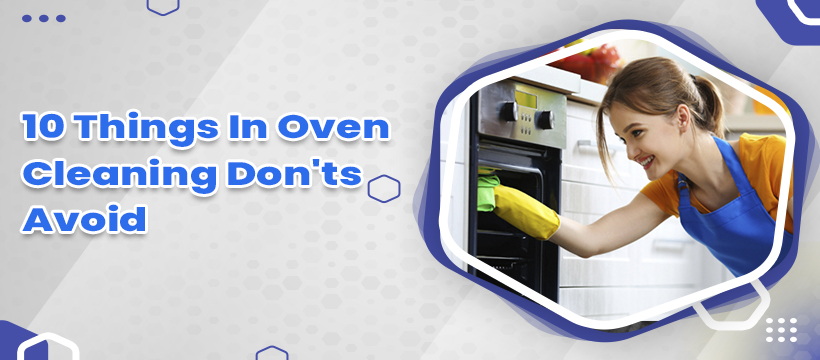
You frequently like cooking and dining at home. The oven is also affected by the cooking. The oven accumulates oil from constant cooking and putting off cleaning tasks. The majority of us don’t bother to clean it, so the residue dries out and becomes more difficult to remove afterwards. To avoid making similar errors, please check out our blog which will help you with your oven cleaning. Please do not make the following mistake:
Oven cleaning is difficult in part because splashes and splatters are frequently overlooked. It’s simple to lock the oven door to hide the filth growing within, but doing so will just make matters worse. Make it a practice to clean spillage and squirts as soon as they’re cold enough to wipe away. It will avoid setting up the messes to solidify and become baked onto the walls.
Messes will get cleaned up when they’re still fresh and simpler to handle if you incorporate this method into your daily kitchen cleaning regimen.
Crowding the oven decreases its efficiency and heightens the risk of a home fire. The hot air can’t move freely if the racks are overstuffed. To keep food warm on the stove, cooking times should be spaced out and covered with a microwave-safe covering.
The foil might not be able to resist the intense heat and could melt into the oven, severely harming it. Your baked items could cook more quickly due to the heat reflected off the foil. The heat radiated off the foil can jeopardize the oven’s heating elements. Even using foil on your baking pans may not be a good idea.
There is also the simple substitute of aluminium foil. When the baking is finished, you may put the cookie sheet, which will catch the drips, in the dishwasher. Another choice is to use an oven-safe silicone liner. If you follow this, you will consume less time in oven cleaning.
It’s easy to use every cleaning product available when a problem is difficult to clean up. However, doing so may result in poisonous vapours and extremely acidic mixtures. Never combine chemicals. Even cleansers that first seem harmless, like white vinegar, can turn poisonous when combined with additional ingredients. Mixing cleanser with chlorine or chlorine solutions is specifically not advised.
In addition to potentially damaging your baking pans, bare rusty layer on oven racks increases the risk of your racks bursting into flames. So when you do see reddish, smudgy rusty traces, scrub them with a soft bristle brush, scouring pad, and a vinegar-and-soap combination. By using this method, you may extend the lifespan of your oven racks and soften rusty flakes.
Check the oven’s handbook to find out which parts are safe to clean and which you should avoid doing so to avoid an oven breakdown. In practice, avoid cleaning the heating components on the roof and bottom of the oven.
Since doing so might lead them to get scratched. In case they are still heated, could cause them to ignite. Similarly, take care while cleaning the elastic gasket of an oven to minimize damage to the seal that keeps heat to escape from the oven.
DIY techniques outperform chemical-based ones by a wide margin. When there is a significant accumulation of oil within the oven, it has frequently been noticed. People start their method for cleaning the oven without considering the repercussions. But they just manage to make a mess.
Regular oven cleaning with DIY oven cleaning tips is quite beneficial. Smoke is frequently seen during the self-cleaning process, especially if the filth and residue have been accumulating for some time. A fire may even break out in such an event.
You could feel the pressure of having too much grease. Chemical cleaners are a good option in these circumstances. Read your user handbook first, though, before using any kind of chemical. Because if the wrong chemical is used, an accident like a fire might be the result.
Employ eco-friendly chemicals wherever possible. Fumes from a harmful substance can lead to respiratory conditions like asthma.
Make sure you read and follow all safety instructions when trying to clean your oven. Specifically, if you have decided to use harsh cleaners for a cleaning setup. Wear gloves and eye protection, and make sure there is enough ventilation. Keep kids far from the kitchen area and pets outside of the house.
If you haven’t equipped a voltage fluctuations surge suppressor, a storm or lightning strike poses a serious risk to the functioning of your electric oven. When installing the gadget, keep the voltage fluctuations surge suppressor plugged in to shield it and any other appliance from harsh weather and excessive electricity.
It’s conceivable that you don’t know everything. However, making errors that might lead to mishaps is unacceptable. Even though you believe taking natural therapies is beneficial. However, take caution when combining any two unidentified ingredients as doing so might damage your oven. Avoid manipulating chemicals by combining them. Even white vinegar has the potential to start a fire when mixed with the wrong ingredient. In this post, you will learn what not to do, so kindly refrain from doing it. The above tips will surely help you with your oven cleaning if you avoid them. For more informative and helpful cleaning tips keep in touch with us. And if you want professional bond cleaning services for your rental property then hire our bond cleaning experts.